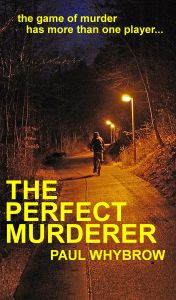Paul Whybrow
Full Member
A report in the Telegraph newspaper earlier this year, written by thriller author Rebecca Whitney, highlights how it is women who predominantly read this genre of crime novels.

http://www.telegraph.co.uk/women/wo...-novels-Are-women-hardwired-to-love-them.html
As Mark Twain observed – ‘There are three kinds of lies : lies, damned lies and statistics.’ Some of the research findings quoted in this report, such as 68% of readers of thrillers are women, need to be taken with a pinch of salt. Any survey is dependent for its accuracy on many different factors. What’s produced from a poll taken at a conference of fans of crime fiction would produce different results to a street survey of passing shoppers.
This newspaper report makes a number of sweeping generalisations about how the sexes are hardwired differently, that had they been aimed at proving differences between the races, would have caused outrage. Nevertheless, the writer’s thoughts on how women relate to working out how to resolve an unhappy situation to restore order, a precise way of summing up what happens in the story arc of a thriller.
Crime stories are one of the best selling genres of fiction, the figure of 25% commonly bandied about for online sales. This partly influenced me, when I was thinking what to write about for my first novel as 2014 began. I'd already written fourteen short stories and novellas, as well as several hundred poems in the previous eighteen months. These tackled love and romance, science-fiction, the paranormal, self-identity and thrillers with a twist to them.
I had a number of concerns that I wanted to address about the state of modern society. These included CCTV, the dehumanising effects of video-gaming, exposure to violent images and how demobbed soldiers remain traumatised by what they've seen and done in combat zones. Such themes suggested a psychological thriller to me, and as part of the overall atmosphere of paranoia that I intended to create, I would emphasize how the system, the establishment, protects itself with cover-ups when it makes mistakes.
I worked long and hard on ‘The Perfect Murderer’, which took some 4,000 hours to produce. I was pleased with the result, while being unsure if it worked as a story that would grab a reader. Fortunately,a good and trusted friend volunteered to be my first reader. She has a fine mind and keen eyes, so is good at pointing out semantic mistakes and dodgy grammar. I was interested to know what she would make of the plot, as she doesn’t normally read thrillers.

I was pleased at the feedback that I got from her, as she said something about smiling at the thought processes of a psychopathic murderer. This man is completely repellent in the way that he considers people, and in what he’s done by murdering a victim a year for forty years, but he’s superficially charming – to get what he wants from people, as psychopaths do. He also has his own physical frailties and eccentric preoccupations, so I tried to make him human through these – wrong-footing the reader, who suddenly realises that they're feeling sympathy for a serial killer! It looks like I pulled that trick off, from my beta reader's reaction.
Writing is a bit like being a magician, in that you know how the trick is done,but you're not sure if your sleight of hand and misdirection has worked on the audience.
Whether ‘The Perfect Murderer’ will sell is another matter. Its success may be assisted by my bumbling attempts at self-promotion through the social media, and also by my free book giveaway on Smashwords.
I hope that what Rebecca Whitney says about women being the main readers of thrillers is true, if the downloads of my erotic verse collection is any indicator of my potential reading public. Almost 1,000 have taken ‘What Do You Like ?’, and I suspect that they are mainly female. I pray that they also like psychological thrillers, and that they remember my name when I publish the novel.
As a marketing strategy, giving away sexually suggestive poetry as a way of selling a novel featuring two sociopathic killers sounds unlikely to me. But then who knows? As the old saying goes – ‘You have to go fishing where the fish are’, which is what I’m trying to do.
I wonder if my bait will work.

http://www.telegraph.co.uk/women/wo...-novels-Are-women-hardwired-to-love-them.html
As Mark Twain observed – ‘There are three kinds of lies : lies, damned lies and statistics.’ Some of the research findings quoted in this report, such as 68% of readers of thrillers are women, need to be taken with a pinch of salt. Any survey is dependent for its accuracy on many different factors. What’s produced from a poll taken at a conference of fans of crime fiction would produce different results to a street survey of passing shoppers.
This newspaper report makes a number of sweeping generalisations about how the sexes are hardwired differently, that had they been aimed at proving differences between the races, would have caused outrage. Nevertheless, the writer’s thoughts on how women relate to working out how to resolve an unhappy situation to restore order, a precise way of summing up what happens in the story arc of a thriller.
Crime stories are one of the best selling genres of fiction, the figure of 25% commonly bandied about for online sales. This partly influenced me, when I was thinking what to write about for my first novel as 2014 began. I'd already written fourteen short stories and novellas, as well as several hundred poems in the previous eighteen months. These tackled love and romance, science-fiction, the paranormal, self-identity and thrillers with a twist to them.
I had a number of concerns that I wanted to address about the state of modern society. These included CCTV, the dehumanising effects of video-gaming, exposure to violent images and how demobbed soldiers remain traumatised by what they've seen and done in combat zones. Such themes suggested a psychological thriller to me, and as part of the overall atmosphere of paranoia that I intended to create, I would emphasize how the system, the establishment, protects itself with cover-ups when it makes mistakes.
I worked long and hard on ‘The Perfect Murderer’, which took some 4,000 hours to produce. I was pleased with the result, while being unsure if it worked as a story that would grab a reader. Fortunately,a good and trusted friend volunteered to be my first reader. She has a fine mind and keen eyes, so is good at pointing out semantic mistakes and dodgy grammar. I was interested to know what she would make of the plot, as she doesn’t normally read thrillers.

I was pleased at the feedback that I got from her, as she said something about smiling at the thought processes of a psychopathic murderer. This man is completely repellent in the way that he considers people, and in what he’s done by murdering a victim a year for forty years, but he’s superficially charming – to get what he wants from people, as psychopaths do. He also has his own physical frailties and eccentric preoccupations, so I tried to make him human through these – wrong-footing the reader, who suddenly realises that they're feeling sympathy for a serial killer! It looks like I pulled that trick off, from my beta reader's reaction.
Writing is a bit like being a magician, in that you know how the trick is done,but you're not sure if your sleight of hand and misdirection has worked on the audience.
Whether ‘The Perfect Murderer’ will sell is another matter. Its success may be assisted by my bumbling attempts at self-promotion through the social media, and also by my free book giveaway on Smashwords.
I hope that what Rebecca Whitney says about women being the main readers of thrillers is true, if the downloads of my erotic verse collection is any indicator of my potential reading public. Almost 1,000 have taken ‘What Do You Like ?’, and I suspect that they are mainly female. I pray that they also like psychological thrillers, and that they remember my name when I publish the novel.
As a marketing strategy, giving away sexually suggestive poetry as a way of selling a novel featuring two sociopathic killers sounds unlikely to me. But then who knows? As the old saying goes – ‘You have to go fishing where the fish are’, which is what I’m trying to do.
I wonder if my bait will work.



